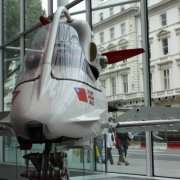Research expedition breaking records on voyage across Antarctica

Six-wheel drive mobile laboratories, a biofuelled ice vehicle that glides on skis, and the latest in wireless mobile sensors are on display today at Imperial College London, UK, as a team of explorers and scientists makes final preparations for a record-breaking 3,600 mile scientific expedition across Antarctica, the driest and coldest continent on Earth.
Imperial scientists are partnering with the Moon Regan Transantarctic team, which is crossing the entire continent of Antarctica via the South Pole on a research-led expedition. As well as gathering data in a number of research areas, the team aims to improve the time for the fastest vehicle crossing of Antarctica and be the first to test biofuel while travelling across this extreme environment.
Researchers are demonstrating how a network of mobile wireless sensors, developed at Imperial, will be used to continuously monitor the environment, the vehicles and the explorers themselves during the expedition. The demonstration gives the team a chance to showcase their technology and vehicles to journalists and the College community before they are packed up and shipped off to Antarctica later this week, in preparation for the trip, which starts in November 2010.
Imperial researchers Dr Robin North, from the Centre for Transport Studies in the Department of Civil and Environmental Engineering, Professor Chris Toumazou, Director of the Institute of Bioengineering, and Antarctic explorer, Mr Andrew Regan, talk about the how they will maximise contribution of the expedition to research in Antarctica.
At the event, on and around the Queen’s Lawn on the South Kensington Campus, the team are showcasing the vehicles that will be used on the expedition. These include the Winston Wong Bio-Inspired Ice Vehicle (BIV), which is one-person, biofuelled powered machine that glides on skis, using radar to detect dangerous crevasses in the ice.
Also on display is a six-wheeled Science Support Vehicle (SSV), which will act as a mobile laboratory while also transporting the 11 explorers and scientists across Antarctica. The team are taking journalists for short drives around the streets of South Kensington to give them a taste of riding in an SSV.
The researchers will also demonstrate Sensium enabled Life Platforms, which expedition members will be wearing to monitor vital signs, such as ECG, heart rate, movement and muscle activity. Scientists from the Winston Wong Centre for Bio-Inspired Technology at Imperial’s Institute of Biomedical Engineering will talk about how they have designed the technology so that people no longer need to be wired up to bulky machines to monitor their health.
Scientists from the Centre for Transport Studies at the College will demonstrate the latest vehicle pollution sensors, which will be attached to the SSVs to monitor their environmental impact. Some sensors will measure multiple types of vehicle pollutants at the same time, while others will assess engine performance including fuel consumption and vehicle reliability.
Dr Robin North, from the Centre for Transport Studies at Imperial College London, says:
“The Moon Regan Transantarctic Expedition offers a lucky few of us a rare opportunity to measure, monitor and learn in one of the world’s last great wilderness and to collect research data for ourselves and for our colleagues back home. Our two six-wheeled mobile laboratories and the Winston Wong Bio-Inspired Ice Vehicle will take us on an epic journey across the continent. All the while, the wireless latest technology will monitor and measure every aspect of the journey. We’ll test the effectiveness of global satellite navigation systems, track our own impact on the Antarctic environment; and continuously monitor our bodies’ response to the extreme conditions.”
During the expedition, the network of wireless sensors will continually record and transmit data to a computer that will be stored in one of the SSVs, so that scientists and explorers can access information about the expedition in the real time. The computer will also be connected to a satellite phone so that information from the sensors can be beamed back to the UK for further analysis by the researchers at the College.
The scientists plan to collect data on topics including: meteorites, which hold the key to the origins of our solar system; the snow surface, which will enable them to examine pollutants carried from across the world; solar radiation, which can teach us about the global climate system; and wind turbulence, which could lead to improvements in air travel and vehicle design.
A major aim of the expedition is to test the viability and environmental impact of the SSVs, which could provide scientists in Antarctica with a low carbon footprint vehicle. The team will also test the effectiveness of biofuels in sub-zero conditions, the performance of emissions control devices and human physiology under extreme conditions.
The expedition will take approximately 40 days to complete. The team will begin on the west coast of Antarctica, leaving from Patriot Hills on around 16 November. They will journey via the South Pole, arriving at the McMurdo research station on the east coast in about two weeks. They will return to Patriot Hills via the same route, arriving back on around 15 December.
Andrew Regan, expedition principal, says: “The Antarctic is a hostile and punishing environment, with the coldest temperatures on Earth. The terrain is unforgiving and the sastruggi and crevasse fields can be treacherous. It is a rare privilege to experience this remarkable continent and to be able to work with our science partner, Imperial College London, to gather important research data. The world has much to learn from Antarctica.”
The project is supported by the Faculty of Engineering, the Department of Civil and Environmental Engineering and the Winston Wong Centre for BioInspired Technology at the Institute of Biomedical Engineering. The expedition is sponsored by Imperial alumnus Professor Winston Wong.
Provided by Imperial College London

















